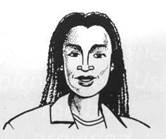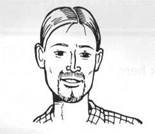Task 1. Fill in the gaps in the text choosing the correct answers given below
Are you forgetful? There's a tremendous range of methods to boost your memory.
Your memory is like a brilliant, but ...1... computer storing a vast amount of information. In fact the memory's capacity is theoretically unlimited. ...2... only about 20 per cent of our daily experience is registered, and of that only a tiny proportion is loaded into long-term memory.
Normal healthy people can improve their memories easily. First of all learn to relax if you are trying to memorize something. You may ...3... important items if your mind is on something else or if you weren't paying attention because of anxiety. Try to combine study with exercise. Keep your mind fit ...4... your body by doing mental workouts. Crosswords, scrabbles and quizzes all help to keep the mind in shape. You can also train your memory in certain ...5.... The ancient Greeks invented memory systems called mnemonics, and they still work today. Most systems involve associating the things you want to remember with something you already have safely stored in your head. For example, if you want to remember numbers try to make associations between numbers in sequence – think of people's ages, special dates, whether they're odd or even.
1. a) unreliable b) expensive с) reasonable d) powerful
2. a) Besides b) Moreover c) Likewise d) Nevertheless
3. a) catch b) pickup c) miss d) get
4. a) alike b) as well as c) well as d) or
5. a) ways b) tricks c) methods d) schemes
Task 2. Choose the one best answer to each question on the basis of what is stated or implied in the text.
1. Which of the following is not true?
a) Unbounded ability of people's memory can be developed or trained.
b) Memory's capacity is theoretically unlimited but practically it is restricted to 20% of what is loaded into long-term memory.
c) People's memory can be compared with a computer storing information.
d) To get rid of forgetfulness one can use a series of methods.
2. Relaxation may:
a) be helpful when memorizing something.
b) be an important item if your mind is on something else.
c) keep your body fit for scrabbles, crosswords and quizzes.
d) combine study with exercise.
3. What are memory systems mostly based on?
a) Sequence of numbers. b) Mnemonics. c) Associations. d) Safe storage of information.
4. What title could you give to the story?
a) Memorial systems of ancient Greeks still at work.
b) How to boost your memory.
c) Long life to long-term memory.
d) Forget-me-not: unlimited capacity of memory.
5. The word capacity means:
a) a feature of forgetful people.
b) an ability to receive, hold or absorb.
c) characteristics of memorabilia.
d) horizons of unlimited memory.
Text 4.
Evening Entertainment.
Task: People in the left column want to do an evening activity. In the right column there are eight ideas for evening activities. Decide which activity would be the most suitable for the following people.
 1. Mandy works until 8 p.m. every evening except for Wednesdays when she works until 10 p.m. She would like to join some kind of exercise class twice a week.
1. Mandy works until 8 p.m. every evening except for Wednesdays when she works until 10 p.m. She would like to join some kind of exercise class twice a week.
 2. Simon plays the guitar in a band. He has always played rock music but has never had lessons. He would now like to learn how to play classical music.
2. Simon plays the guitar in a band. He has always played rock music but has never had lessons. He would now like to learn how to play classical music.
 3. Jim wants to meet people. He doesn't want to do a sport and he's not interested in languages. He'd like to do something educational.
3. Jim wants to meet people. He doesn't want to do a sport and he's not interested in languages. He'd like to do something educational.
 4. Liz enjoys art and literature. She's not a very active person and doesn't drive. She enjoys talking to people and doesn't want to do anything too academic.
4. Liz enjoys art and literature. She's not a very active person and doesn't drive. She enjoys talking to people and doesn't want to do anything too academic.
 5. Kate would like to take some exercise but doesn't want to join a regular class. She would like to make new friends through a sporting activity.
5. Kate would like to take some exercise but doesn't want to join a regular class. She would like to make new friends through a sporting activity.
| A. Getting fit doesn't have to be dull. Work out to the sound of your favourite music with a group of keen, active people and top trainers. Classes on Mondays and Wednesdays 7 p.m. -8 p.m. В. Study French at all levels with qualified teachers. We have regular French cultural social events both on site and at other local places of interest, including restaurant and cinema trips. We also hold a yearly French weekend away. Contact us for details of class times. С. We'd like to set up a team of keen volleyball players for fun matches with other leisure centres. Don't worry if you've never played, we'll show you how. Sessions: Wednesdays and Fridays 7.30 p.m. -8.30 p.m. Lots of time off the court for weekend social events too. D. Study classical music - learn about the history of classical music and about many famous composers. Enjoy frequent visits to concerts and meals afterwards to discuss your ideas. Classes take place on Tuesdays 7 p.m. to 9 p.m. Visits to concerts are usually arranged for weekends. E. If you want to try something different why not have a go at swimming pool aerobics? Our classes are on Tuesdays and Thursdays at 8.30 p.m. — 9.00 p.m. Swimming pool aerobics is an excellent and enjoyable way to keep fit and is recommended for people of all ages. F. Join our friendly walking group for walks in the countryside. We are a fairly experienced crowd, so please make sure you have the right equipment and the right level of fitness. We don't want to leave you behind! Walks arranged every other weekend. G. One to one teaching — piano, violin, guitar, trumpet, etc. Take the opportunity to practise basic skills and then move on to more difficult classical pieces. Reasonable prices. Hours are arranged with individual tutors. H. Join our reading group for relaxed discussions. All you have to do is read a book a week and be prepared to invite a group of friendly people into your home for a chat about books. Every Monday night. |
Text 5.